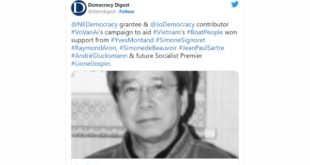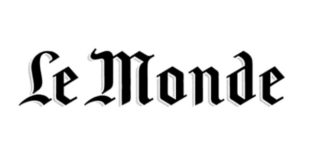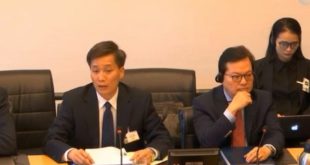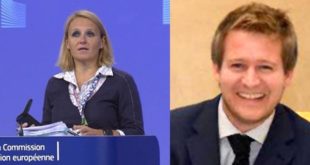HANOI, Oct 28, 2004 (dpa) – A prominent Buddhist dissident has called on authorities in Vietnam to release him and another religious leader from house arrest, a rights group said Thursday.
In a letter sent to leaders in one-party Vietnam, Thich Quang Do called on Vietnam’s prime minister, national assembly president and secretary general of the Communist Party to release him and Thich Huyen Quang, leader of the banned Unified Buddhist Church of Vietnam.
“The UBCV patriarch and I have spent 378 days under administrative detention… In the civilized world, I have never heard of any country that imprisons its citizens by mere ‘verbal orders’ as they do in Vietnam,” Do said in his letter, parts of which were released by the International Buddhist Information Bureau (IBIB).
Although a handful of religions are permitted by the state in Vietnam – the most prominent of which are Buddhism and Catholicism – people who belong to groups not recognized by the government face repression.
Last year, Thich Quang Do and Thich Huyen Quang were involved in a stand-off between police and supporters after they attended a UBCV meeting in central Vietnam in October.
Following the stand-off, Vietnam’s press spokesman said the pair had been arrested because they were carrying “state secrets”, although no charges have been laid since their detention over a year ago, Do said in the IBIB statement.
“We have not been told what crimes we have committed and we have never been formally sentenced or convicted of any criminal offence,” Do said in the statement. “For the past four years, my telephone has been cut off, secret police have kept round-the-clock surveillance on my monastery and all visits have been strictly prohibited.”
Last month, Vietnam was named as a “country of particular concern” by the U.S. State Department for its lack of religious freedom.
Vietnam insists that no one in the communist country is jailed or detained for their political or religious beliefs, but laws barring criticism of the government mean critics can and do face prison sentences and house arrest.
dpa st blg
 Quê Me Quê Me: Action for democracy in Vietnam & Vietnam Committee on Human Rights
Quê Me Quê Me: Action for democracy in Vietnam & Vietnam Committee on Human Rights




